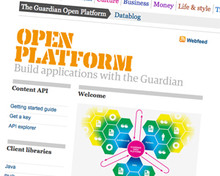
"We're going to have to go into this with a partner attitude because we don't have the services in place; we don't have a clearance on how that's going to work. People can sell their own advertising and keep the revenue," Matt McAlister told Journalism.co.uk.
Developers may be asked to join an ad network as part of the platform's terms of service, he added.
The platform, which allows approved partners to use the Guardian's API and data to build new applications, lets developers build a successful advertising network around the new facility.
Speaking at the event, BBC technology correspondent Rory Cellan-Jones said he could 'see the attractions for the Guardian' in embracing the current trend for openness.
"Openness is the major trend of the last couple of years - building a platform, getting people in. One of the attractions is that you get a lot of the work done by a lot of people," Cellan-Jones said.
The Apple iPhone has been 'incredibly successful' in taking advantage of the willingness of developers to help build applications, he added.
"The marketing and development of the iPhone was largely done by a huge army of developers, just a few of whom make a living from it," Cellan-Jones told Journalism.co.uk.
"With the iPhone you've got a subscription model; people paying subscriptions for various applications. It's a lovely hippy and free love model for the Guardian's platform, but it's slightly less clear, personally, how the revenue starts coming in," he said.
During an interview at the summit with Cellan-Jones, Rafat Ali, founder of Guardian-owned ContentNext, which publishes several digital business news sites, said the paid-for premium content model was crumbling.
"When I started paidContent I though that was going to be the future. [Paid for] premium content only works if premium content or analysis is of premium quality," he said.
Not all quality journalism will survive the economic recession, he said, adding that working news models of the future would be mixture of citizen journalism, subscription-based, commercial and government-funded models.
"A year ago, people were looking at graphs of online advertising which were heading up, and suddenly that's flattened and people are beginning to realise that just as they were about to start replacing offline with online revenues, the well is running dry. The growth has stopped completely," Cellan-Jones told Journalism.co.uk.
"That is leaving a lot of people suddenly searching for a business model - not just big established media organisations, but a whole wealth of web 2.0 start-ups which have never come to profitability."
Cellan-Jones also referred to an Economist editorial published today that declared 'the end of the free lunch' for web 2.0: "[E]very business needs revenues - and advertising, it transpires, is not going to provide enough.
"Free content and services were a beguiling idea. But the lesson of two internet bubbles is that somebody somewhere is going to have to pick up the tab for lunch."
Free daily newsletter
If you like our news and feature articles, you can sign up to receive our free daily (Mon-Fri) email newsletter (mobile friendly).









